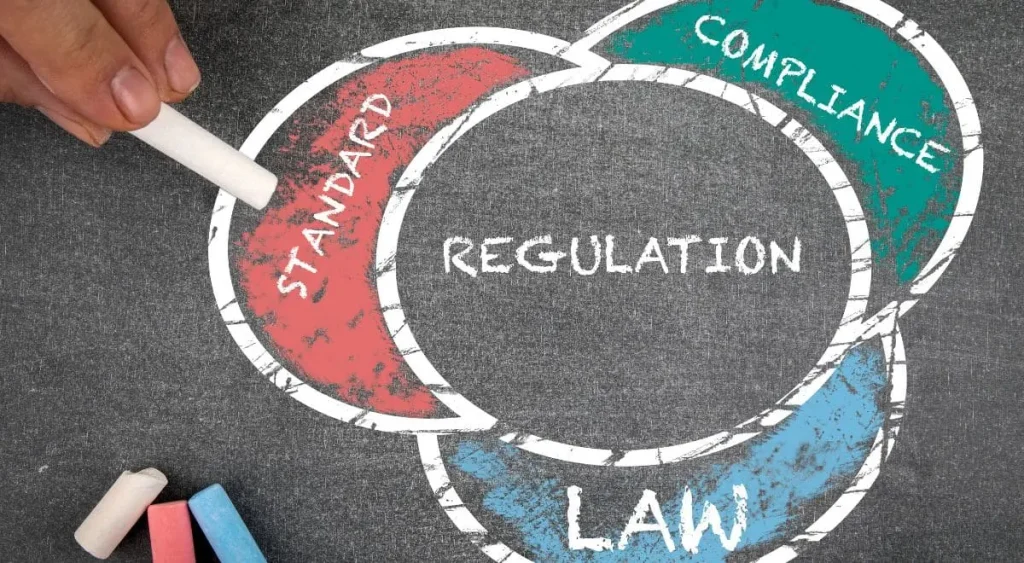Cryptocurrencies, once a specialized technology primarily used by computer enthusiasts, are now rapidly expanding into a worldwide financial sector. Bitcoin (BTC) has served as a model for tens of thousands of different cryptocurrencies, each with its own set of characteristics and applications. Governments and regulatory agencies from all around the world have struggled to control and regulate this quickly changing environment in the wake of the emergence of cryptocurrencies. Tax law, consumer protection, and cybersecurity are all affected by the high price volatility of cryptocurrencies and the opportunity for a wide range of investors—from individual traders to institutional players—to earn astronomical returns. Additionally, there is a risk that coins and tokens will be used to support illicit activity. Cryptocurrency Regulations on a global scale has become a difficult but necessary work for investors, developers, enthusiasts, and policymakers.
What are the Cryptocurrency Regulations?
Governments create regulations for cryptocurrency in order to define many aspects of digital assets, including legal and procedural frameworks. Many jurisdictions have different cryptocurrency laws, ranging from comprehensive guidelines aimed at assisting blockchain users to complete prohibitions on the usage or trading of cryptocurrencies.
Regulations related to digital assets may cover the creation, purchase, sale, and exchange of digital currency. Lawmakers or government organizations may additionally determine the exact way in which digital assets are integrated with the current financial systems.
For digital currencies to prosper and be widely used, there must be strict and definite laws. For the crypto industry, a top-notch regulatory framework can achieve the following:
- Offer protection to investors against cryptocurrency frauds and market manipulation.
- Make certain that the relevant and accurate information is always provided to investors.
- Discourage illegal activity such as financing of terrorism and money laundering.
- Make the tax laws related to cryptocurrencies clear.
- Encourage greater market involvement by enhancing investor trust.
- Motivate businesses to use blockchain technology for innovation.
- Encourage blockchains to work together.
- Improved industry oversight can help lower systemic risk.
- Increase accessibility to cryptocurrencies to promote equality.
Also, read : Impact of Gary Gensler’s Statement on Crypto.
Various Methods of Cryptocurrency Regulations
Regulations related to cryptocurrencies differ greatly between countries, which reflects a variety of viewpoints and concerns around their widespread use. In an effort to become tech hubs, a few countries have embraced blockchain technology and cryptocurrencies, encouraging investment and innovation in the field.

Some have chosen to be more careful approaches, while some have simply banned any activity related to cryptocurrencies.
- Countries Accepting Cryptocurrencies: El Salvador, Estonia, Malta, and Switzerland, for example, have identified themselves as centers of cryptocurrencies, providing a conducive atmosphere for blockchain and cryptocurrency enterprises. They seek to achieve a balance between protecting investors and promoting innovation.
- Countries Restricting Cryptocurrency: nations with a lot of regulations: Governments like Bolivia, China, Nepal, Algeria, and Bolivia have adopted a strong anti-cryptocurrency position, restricting cryptocurrency-related activities including trading and initial coin offerings (ICOs) due to worries about volatile markets and unstable finances.
- Balanced Regulations: The European Union (EU) along with other authorities have taken a balanced stance. They acknowledge the potential advantages of cryptocurrencies and blockchain technology while putting laws in place to reduce dangers, like Know Your Customer (KYC).
International Organizations’ Roles
The worldwide reach of cryptocurrencies presents a distinct barrier for regulatory bodies. Cross-border transactions happen without the need of conventional financial middlemen. This facilitates effective handling of regulatory issues requiring international coordination and cooperation.
Global standards are being established by international organizations such as the Basel Committee on Banking Supervision and the Financial Action Task Force (FATF). These groups seek to prevent illegal activity from using cryptocurrency as a shelter, level the playing field, and lower the possibility of regulatory arbitrage.
Challenges to Cryptocurrency Regulations
It’s difficult to get through the worldwide crypto regulatory environment for a number of reasons.
- Blockchain technology and cryptocurrencies are developing quickly, which makes it hard for authorities to keep up with new developments. Legislation can take years to be implemented.
- As several nations have established radically diverse regulatory frameworks, there are discrepancies that might impede innovation and make it harder for multinational corporations to comply with the law.
- Businesses and investors experience uncertainty and a lack of confidence due to regulatory frameworks that are often unclear or open to interpretation.
- As blockchains and cryptocurrencies are fundamentally global, it is challenging to impose laws globally and guarantee compliance between governments.
Cryptocurrency Regulations Around the World
Several countries have included cryptocurrencies in their current taxes and anti-money laundering (AML) frameworks, while others have gone one step further and created laws specifically regulating the usage of cryptocurrencies.
The involvement of numerous governmental and financial regulatory organizations, as in the US and UK, may delay the regulatory framework modifications that many countries are currently undertaking.
1. United States
In the United States, cryptocurrency regulation is a complex landscape involving multiple regulatory bodies:
- Securities and Exchange Commission (SEC) oversees crypto assets that qualify as securities.
- Commodity Futures Trading Commission (CFTC) treats cryptocurrencies as commodities, regulating futures and derivatives markets.
- Internal Revenue Service (IRS) classifies cryptocurrencies as property for tax purposes, requiring reporting of gains and losses.
- Financial Crimes Enforcement Network (FinCEN) imposes anti-money laundering (AML) and know-your-customer (KYC) obligations on crypto exchanges and wallet providers.
The SEC’s long list of filings against projects and companies focused on cryptocurrencies, including legal action and charges targeting Ripple, Coinbase (COIN), Binance (BNB), and numerous others about their cryptocurrency-related goods and services, shows that the agency is already regulating the industry.
The U.S. is actively working on a regulatory framework that could provide clearer guidelines for the industry, with significant debates around the classification of various cryptocurrencies as securities.
2. China
Crypto currencies are banned from functioning in China by the People’s Bank of China (PBOC), which claims that they enable public financing without authorization.
Furthermore, China restricted the mining of bitcoin in May 2021, requiring many participants to either completely cease operations or transfer to countries with more benevolent legal frameworks. Additionally, cryptocurrencies were banned in September 2021.
3. Canada
Although cryptocurrency is not accepted as legal money in Canada, the nation has regulated it more aggressively than others. A few Bitcoin exchange-traded funds (ETFs) have begun to trade on the Toronto Stock Exchange, making Canada the first nation to approve an ETF.
Regarding cryptocurrency trading platforms, dealers and platforms must register with provincial authorities according to regulations set forth by the Investment Industry Regulatory Organization of Canada (IIROC) and the Canadian Securities Administrators (CSA).
All cryptocurrency investment companies are required to be registered at the Financial Transactions and Reports Analysis Centre of Canada (FINTRAC) and are categorized as money service businesses (MSBs) in Canada. Canada views cryptocurrencies in the same taxing manner as other commodities.
4. United Kingdom
While the UK supervises digital asset firms, it usually does not impose regulations on cryptocurrencies per se. As the Advertising Standards Authority seeks to control cryptocurrency advertising, the Financial Conduct Authority makes sure that cryptocurrency companies follow to best standards to prevent money laundering and the funding of terrorism. For taxation purposes, the United Kingdom regards cryptocurrency as a capital asset.
For the most part, people believe that American and British regulations on cryptocurrencies are comparable. Regulations have generally encouraged innovation in the cryptocurrency space, but authorities are starting to crack down on issues with laundering of funds and fraud associated with the industry.
In the summer of 2021, the Financial Conduct Authority (FCA), a regulator in the United Kingdom, even outlawed all activities by Binance, the largest cryptocurrency exchange globally.
5. Japan
Japan has adopted a progressive stance towards cryptocurrency rules, acknowledging them as legal property through the Payment Services Act (PSA). Cryptocurrency exchanges operating in the nation are required to adhere to AML/CFT regulations and registered via Financial Services Agency (FSA). All cryptocurrency exchanges are members of the Japanese Virtual Currency Exchange Association (JVCEA), which was founded in Japan in 2020. Japan taxes investors based on their cryptocurrency trading winnings, which are treated as miscellaneous income.
A number of regulatory issues, including taxation, have been the focus of national efforts. The government declared in September 2022 that it will implement remittance regulations as early as May 2023 in order to stop criminals from exploiting cryptocurrency exchanges as a means of money laundering. A revision to the Act on Prevention of Transfer of Criminal Proceeds will permit the gathering of consumer data.
6. Australia
Australia taxes capital gains on cryptocurrencies because it considers them to be legal property. As long as exchanges fulfill certain AML/CTF requirements and registered at the Australian Transaction Reports and Analysis Centre (AUSTRAC), they are free to operate in the entire country.
It was 2019 when regulatory rules for initial coin offerings (ICOs) started by the Australian Securities and Investments Commission (ASIC). It forbade exchanges from selling private coins, which are digital currencies that mask money transfers throughout their networks in order to maintain anonymity. Australia declared in 2021 that it would develop a regulatory framework for cryptocurrencies and perhaps introduce a central bank digital currency (CBDC). The Australian Treasury said in October 2023 that it would be introducing a framework for regulation, with a draft expected to be published in 2024.
7. European Union
The majority of the European Union (EU) allows cryptocurrency, yet each member state has its own exchange governance system.
In the meantime, taxes in the EU vary from 0% to roughly 48% depending on the nation.
The Fifth and Sixth Anti-Money Laundering Directives (5AMLD and 6AMLD) of the EU have just gone into force, strengthening standard reporting requirements and KYC/CFT duties.
The Markets in Crypto-Assets Regulation (MiCA), a framework that strengthens consumer safeguards, lays out clear guidelines for the crypto industry’s behavior, and adds new licensing requirements, was suggested by the European Commission in September 2020.
Parliament passed laws requiring some cryptocurrency service providers to apply for an operational license in April 2023. MiCA was implemented in July 2023 after being tentatively agreed upon in 2022. This legislation aims to protect users while arming regulators with the means to track cryptocurrency used for laundering money and financing terrorists.
8. Brazil
Although Brazil does not recognize Bitcoin as legal cash, the nation has legalized cryptocurrencies as forms of payment nationwide, which has increased the use of virtual currencies. On November 29, 2022, the Chamber of Deputies of Brazil passed a legislative framework that allows the implementation of cryptocurrencies as payment methods throughout the nation.
On June 20, 2023, the measure became law and was designated as Law No. 14,478, or the “Legal Framework for Virtual Assets.”
In accordance with Decree No. 11,563 of June 13, 2023, the Brazilian Central Bank was appointed as the competent authority to control, approve, and oversee the operations of cryptocurrency exchanges.
9. India
India is still unclear on the regulation of cryptocurrencies, neither legalizing nor banning their use. A bill that forbids the use of any private cryptocurrency in India is now in the works, although it has not yet been put to a vote.
All crypto investments are subject to a 30% tax, and trades in crypto are subject to a 1% tax deduction at source (TDS).
In general, India is still hesitant to regulate or outright forbid cryptocurrency. The nation’s Finance Bill of 2022 established tax regulations for the collection of income taxes from virtual digital assets and classified them as property.
The Financial Services Commission (FSC) division of the Korea Financial Intelligence Unit (KFIU) allows exchanges for bitcoin and other virtual asset service providers to register. In 2021, South Korea similarly outlawed the exchange of any privacy coin.
10. South Korea
The Act on the Protection of Virtual Asset Users, passed by the South Korean government, became operative in 2023. The Act specified both allowed and illegal applications of virtual assets and formally established the Financial Services Commission as their regulator.
Furthermore, by forcing suppliers or suppliers of services follow to specific procedures, the Act guaranteed user protection.
11. Singapore
This island nation views cryptocurrencies as property rather than legal money, just like the United Kingdom does. Exchanges are licensed and governed by the Monetary Authority of Singapore (MAS) in accordance with the Payment Services Act (PSA).
In 2022, Singapore released guidelines advising producers of digital payment tokens (DPTs) against advertising their offerings.
In August 2023, MAS (Monetary Authority of Singapore) set a framework. This framework is designed to govern stablecoin offerings in the nation. It mandates certain requirements for issuers. Stablecoins can use the designation “MAS-regulated stablecoin”. However, this is only after receiving approval from the MAS. Singapore has earned a reputation as a bitcoin safe haven. This is due in part to the lack of taxes on long-term capital gains.
Conclusion
Global cryptocurrency regulation is a combination of diverse approaches, reflecting the varying priorities and concerns of individual countries. While some nations embrace the potential of cryptocurrencies and blockchain technology, others are more cautious, emphasizing investor protection and financial stability. As the cryptocurrency market continues to evolve, we can expect further developments in regulatory frameworks worldwide.
FAQ
Cryptocurrency regulation involves the rules and guidelines established by governments and financial bodies globally. These rules govern how digital currencies and assets, such as Bitcoin, Ethereum, and other altcoins, are created, distributed, and traded. They also cover the taxation and general usage of these digital assets.
Cryptocurrencies are regulated for several important reasons. First, regulations are in place to protect investors from potential risks and fraud. Second, they help prevent illegal activities, including money laundering and terrorism financing. Third, regulations aim to ensure the overall financial stability of the economy.
Countries like Switzerland, Singapore, Malta, and Estonia are known for their favorable cryptocurrency regulations. These countries have created legal frameworks that support cryptocurrency trading. They also support the development of blockchain technology.
Cryptocurrency regulations vary significantly across countries due to differing legal systems, economic policies, and attitudes towards digital currencies. Some countries embrace cryptocurrencies with open regulations. While others impose strict regulations due to concerns over financial stability, control, and illegal activities.




